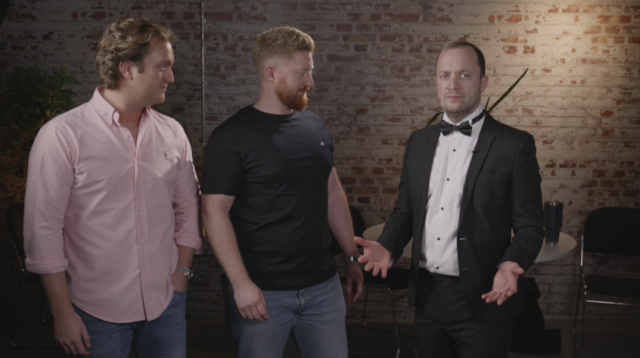Let’s Be Honest – No One Is Excited to Read Your Job Ad
You know that moment when you open your inbox and see a reminder about your tax return? That sinking feeling, the desperate urge to be anywhere else? That’s how candidates feel when they read a bland, jargon-packed job ad.
Most job descriptions read like they were written by a committee of lawyers and accountants who were specifically told to remove anything resembling a personality. “We’re looking for a self-starter with a proven track record of stakeholder engagement, a dynamic approach, and the ability to work in a fast-paced environment.” Translation: We don’t really know what we want, but we’ll be annoyed if you can’t do it.
If your job ad is full of vague buzzwords, a laundry list of unrealistic demands, and zero insight into what makes your company actually worth working for, don’t be surprised if the best candidates scroll past you.
But fear not—we’re here to show you how to inject some life into your job ads and actually attract the people you want.

The 3 Biggest Problems with Most Job Ads (And How to Fix Them)
1. You Sound Like Every Other Company
Take a look at your last job ad. Now Google a similar role and compare. Spot the difference? No? Neither can your candidates.
If your ad sounds like it was copy-pasted from a corporate handbook, you’re blending into the background. And in a competitive hiring market, that’s the last thing you want.
How to fix it:
- Drop the generic phrases like “fast-paced environment” and “dynamic team.” What does that actually mean for the person reading it?
- Inject some personality—if your team is lively and collaborative, say so. If your office is all about work-hard-play-hard, be honest about it (without cringey clichés).
Example of a fix:
- ❌ Bad: “We offer a competitive salary and the opportunity to work in a dynamic team.”
- ✅ Good: “You’ll be working with a tight-knit finance team who take their spreadsheets seriously but know when to crack open the Friday beers.”
If your job ad sounds like an actual human wrote it, you’ll instantly stand out.
2. The Laundry List of Unrealistic Expectations
We see it all the time: “Must have 10 years of experience, 3 degrees, and the ability to speak fluent Excel.”
The problem? The perfect candidate you’re describing doesn’t exist. And if they do, they’re probably not applying because they already have six job offers on the table.
When you create a wishlist longer than a Christmas shopping list, you scare off great candidates who might have 80% of the skills but feel they’re not “qualified enough.” Meanwhile, someone who thinks they can do the job (but really can’t) will apply anyway.
How to fix it:
- Prioritise the top 3-5 must-haves. Be clear on what’s essential vs. what can be learned.
- Use inclusive language—women and underrepresented groups are less likely to apply if they don’t meet every bullet point.
Example of a fix:
- ❌ Bad: “Must have a master’s degree, 8+ years of experience, and be an expert in 15 different finance software tools.”
- ✅ Good: “You’ll need solid experience in financial reporting and a knack for making sense of numbers—if you’ve worked with Xero or SAP before, great! If not, we’ll get you up to speed.”
Hiring is about potential as much as experience. If you only chase unicorns, you’ll be waiting forever.
3. No One Knows What’s In It for Them
Companies love listing what they expect from candidates but forget to mention why anyone would actually want to work there.
Top talent isn’t just looking for a job; they’re looking for a reason to choose you.
How to fix it:
- Instead of just listing benefits, sell the experience. What’s exciting about the role? Why is your company great?
- If you have flexible working, great culture, or cool perks, don’t just say it—explain what it means day to day.
Example of a fix:
- ❌ Bad: “We offer a competitive salary and great benefits.”
- ✅ Good: “We know finance jobs can be demanding, which is why we offer fully flexible working, 25 days of holiday (plus your birthday off), and a bonus structure that actually rewards your hard work.”
If your benefits sound exciting and meaningful, candidates will actually picture themselves working there—which is half the battle.
Bonus Tip: Make It Easy to Apply
- If you make people jump through hoops just to submit a CV, don’t be surprised when they don’t bother.
- Ditch the 30-minute application forms. No one wants to re-enter every detail from their CV.
- Skip the pointless cover letters (most candidates write them just to tick a box).
- Make sure your process is mobile-friendly—most candidates will see your ad on their phone.
- If your hiring process is smooth and simple, you’ll get more applicants (and fewer dropouts).
Final Thought: If You Want Great People, Write Like a Great Company
Your job ad is your first impression. If it’s dry, confusing, or full of buzzwords, you’re turning off the exact people you want to attract.
But if it’s clear, engaging, and actually human, you’ll not only get more applications—you’ll get the right ones.
So go on, rewrite that job ad like you actually want someone to apply.
Or better yet—let We Do Group do it for you. We help businesses hire finance talent without the headache.





